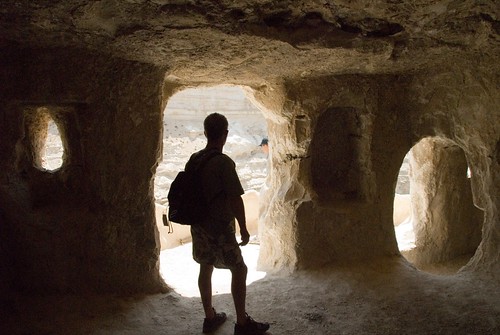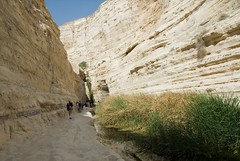
Wikipedia's Entry on the Wilderness of Zin
This was May 18 in the morning when we went to the Wilderness of Zin, after spending the night in a very nice hotel in Mizpe Ramon. Mickey told us the proper spelling should be "Tzin," but because the "tz" sound in Hebrew is hard for non-Hebrew-speaking people, it has been translated "Zin."
Having read the bible several times, and specifically Numbers chapter 20, coming here gave me the strongest feeling of awe and amazement I think I've ever had about a place up to this time. This is the place where Moses got frustrated with the people who were complaining about there being no water, and instead of being directly obedient to God, in frustration and anger he struck the rock twice. Read it for yourself to get the whole story.
I have a theory. I haven't talked about this to anyone. Maybe I should email Mickey and ask him about it. My theory goes like this:
The events in Numbers 20 happened around 4,000 years ago, right? And at that time, there was no water here, according to the story, otherwise the people would not have been complaining about there being no water. My theory is that this place didn't look like this back then. It's true, it's in the bottom of a canyon, but I think the canyon was not there, or at least not that deep at that time. So Moses and the people would have been on somewhat of a flat area where they could all congregate around him. When God told Moses to speak to the rock, and when Moses instead struck it, God was merciful to allow water to come out of the rock anyway, even though He pronounced judgment on Moses. There would have to have been a lot of water to supply as many as two million people. And the water is still there coming out of the rock today.

Here's my point: the soil erosion of the water in that canyon over 4,000 years would be enough to cause the canyon to look like it is today. It's entirely plausible to me that the canyon we hiked up was not a canyon at the time of Moses, but has become a canyon because of the erosion of all that water over all that time.
Mickey??
Mickey Answers Back
Mickey sent me an email stating his position, which is that he is not an expert on the geology of the place, and that the most important thing is the theology. He recommended a couple of books that might explain the geology of the place, and I went ahead and did a web search and came up with some information that basically shut my mouth. I have come to realize that I'm just idly speculating, and that if I want to really find out, I should do the legwork. Short of that, I wrote this reply (edited for clarity):
Mickey,
Thanks for your reply. I do appreciate the shift from "geology to theology," since that should be, and hopefully is, my focus in all things concerning Israel. God has made it abundantly clear in His word that that land is the land He has chosen for His people, all for His glory. Sitting on the rock next to the water, listening to and reading the passage in Numbers 20, I just couldn't help but wonder, "where exactly was it that Moses struck the rock?" And, "where would the people have been congregating, all 2 million of them?" It was a nice shady place to sit, where we could all fit comfortably next to the waterfall and absorb the importance of of the place in the context of the biblical text. That gave rise to a profound sense of awe and wonder that this was a place where God worked a wonder before the people of Israel.
Then when we walked above that part of the canyon, seeing the water above where we had sat, one thought led to another, and my theory developed.
I guess I just have a tendency, like those people in the Church of the Holy Sepulchre who were kissing the stone where supposedly Jesus had been laid, to worship place rather than the God who is present in the place - and more importantly, in my heart. I am willing to qualify my wonderings as just pure speculation, especially after finding an article on the web and realizing I'm going into territory that is over my head.

No comments:
Post a Comment